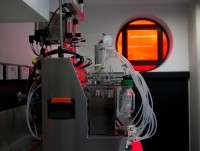(PhysOrg.com) -- Potentially lethal bacteria can now be more quickly and readily identified, thanks to a new research laboratory at Swinburne University of Technology.
The laboratory, located at the university’s Hawthorn campus, is a partnership between Swinburne and bioMérieux, a world leader in the field of in vitro diagnostics.
It is the only lab in Australia with a research-grade Matrix Assisted Laser Desorption Ionization (MALDI-TOF) instrument and access to bioMérieux’s extensive microorganism database. This means Swinburne researchers will be able to identify microorganisms, including bacteria and fungi, in a fraction of the time it takes most other labs.
According to Associate Professor Enzo Palombo, the facility will work in much the same way as a police fingerprint database.
“We take a sample of the suspect bacteria, and run it through the MALDI-TOF,” he said. “The MALDI-TOF then analyses the bacteria’s properties and cross references them against the 3500 microorganism signatures included in the bioMérieux reference database. From here we can pinpoint the exact type of microorganism it is.
“This process takes just one minute, compared to traditional methods of identification which can take up to three days.”
Associate Professor Palombo said this will enable easier, cheaper and more rapid identification of microorganisms from clinical, industrial, agricultural and food environments.
“When dealing with bacteria, especially strains that have the potential to cause harm, rapid identification is vital,” he said. “This is obviously true for medical applications, but it extends to other industries as well.
“For example, if there is a contamination at a food manufacturing facility we would be able to identify the bacterial culprit very quickly. This makes it much easier to contain the outbreak, reduce waste and downtime and minimise the spread of infection.”
Not only does the system identify the type of microorganism, it is also capable of determining where a specific strain has originated.
“The system is potentially able to recognise different strains of contaminants, allowing us to ID specific bacterial culprits,” Associate Professor Palombo said. “This has significant implications, particularly in areas such as bioterrorism. “
The MALDI-TOF Reference Center has already attracted interest from external clients including clinical, government and food laboratories, further consolidating Swinburne University of Technology's biotechnology capabilities.
Provided by Swinburne University of Technology





















